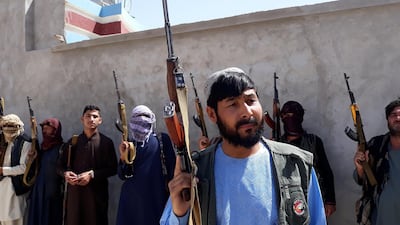Thousands of Afghan civilians have answered the government's call to take up arms against the Taliban as the insurgents make rapid territorial gains, officials said.
"People are coming out in the thousands to support the Afghan forces," Defence Ministry spokesman Fawad Aman told The National. "We are providing them with any support or facilities they need, including weapons, ammunition and food."
In videos shared on social media about what is being called “the people’s uprising,” civilians are seen receiving weapons, marching and patrolling in cities across the country, including in the northern provinces of Takhar, Kapisa, Baghlan and Balkh where the Taliban have stepped up attacks in recent weeks.
Photos from Jowzjan, another northern province, showed groups of women, some of them in the traditional blue burqas, holding Kalashnikovs after signing up to fight the Taliban.
With Afghan forces under increasing pressure, Defence Minister Bismillah Mohammadi called for civilians to mobilise against the Taliban in one of his first acts after being appointed on June 19.
“The government is ready to provide the necessary support to the people’s forces against the Taliban," he said during his introductory speech in parliament on Monday.
Despite holding peace talks with the government, the Taliban have stepped up attacks since the US announced in April that it would withdraw all its troops from Afghanistan by September. According to the latest data from the Long War Journal, which maps the Afghan conflict, the Taliban control more than 130 of the country's nearly 400 districts.
The Wall Street Journal reported on Wednesday that a new US intelligence report estimates that the Taliban could win control of the country's capital within six to 12 months of the US withdrawal.
With the peace talks in deadlock and the Taliban advancing, many Afghans fear they will lose the freedoms gained since the 2001 US-led invasion toppled the hardline Islamic group’s regime.
Mr Aman said the response to the defence minister’s call was “testimony to how much Afghans dislike the Taliban and do not want to go back to the dark days”.
“We calculated over 2,000 citizens who are armed and fighting against the Taliban” in Balkh alone, he said, and added that the numbers were “increasing day by day”.
Faridullah, a young farmer from Doshi district in Balkh, decided to join the fight after the Taliban seized control of the area on Monday. At 18 years old, he is younger than the Taliban insurgency and said he had never used a gun before.
“It was for defending my land and honour. Together with Afghan forces, we liberated Doshi yesterday,” he said proudly.
Faridullah was speaking to The National on Wednesday in the provincial capital, Pul-e-Khumri, where he travelled along with other civilian fighters, many of them of a similar age, to defend the city from a Taliban invasion.
"We reassure the people of the city to not be afraid. We are here to protect them. I have picked up guns so they don't have to," he said as they guarded the southern gates of the city.
"This is our land and we will die to protect it with our last fighting breath," added Safar Mohammad, 20, a civilian fighter from Deh Salah district in Baghlan.
Although keen, these young men have received little in the way of combat training besides being shown how to use their weapons.
Experts have voiced doubts about the effectiveness and long-term consequences of creating a civilian fighting force.
“The historical precedents of militias in Afghanistan are pretty diverse; they have played a number of roles in the last 40 years of war. Sometimes militias have made the critical difference between state survival and collapse. But in almost every case, the human rights records of militias have been abhorrent,” said Andrew Watkins, Crisis Group's senior analyst for Afghanistan.
Mr Watkins said that, although the Afghan security sector appeared to have been testing and “pilot-programming” such an initiative for some time, he doubted "any serious planning has gone into future disarmament, or even how to hold such forces accountable, or even how to ensure such forces don't collapse and hand over additional equipment over to the Taliban”.
"Unless uprising forces' activities are closely co-ordinated, and without at least a bare minimum of training and organisation, they are unlikely to be an effective military deterrent against Taliban offensives," he said.
But not all volunteers lack battle experience. Mohammad Sarwar Niazi, 56, said he fought against Soviet occupation in the 1980s and also against the Taliban as part of the late resistance leader Ahmad Shah Massoud's Northern Alliance.
"I have never been afraid of the Taliban and have defeated them in the past. My only regret is that I stopped fighting," he told The National.
Responding to the government’s call, he has mobilised more than 100 civilians to fight the Taliban in Kapisa province.
“I don’t need the government’s support, I have my own weapons. We may just be civilians now, but we are the very civilians who defeated the Soviets,” he said.
“But had the government valued our experience and sought our support sooner, then we wouldn’t be in this mess.”

